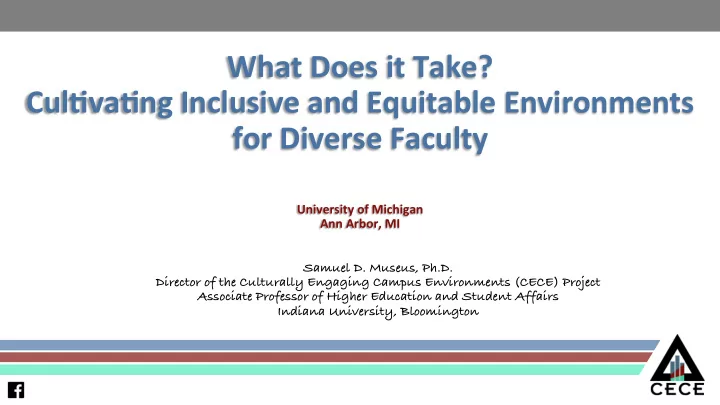

What Does it Take? Cul1va1ng Inclusive and Equitable Environments for Diverse Faculty University of Michigan Ann Arbor, MI Samuel D. Museus, Ph.D. Director of the Culturally Engaging Campus Environments (CECE) Project Associate Professor of Higher Education and Student Affairs Indiana University, Bloomington
The CECE Project 1. Educational Equity 2. Systemic Transformation 3. Common Vision 4. Inquiry and Evidence
Challenges on Campus Hostility in the Classroom • Scrutiny of Research Agendas • Marginalization and Isolation • Tokenism • Cultural Taxation • Salary Inequities • Glass-Ceiling •
The CECE Faculty Framework • Cultural Relevance : Five indicators focus on the ways that institutional environments are relevant to the cultural backgrounds and communities of diverse faculty: § Cultural Familiarity § Culturally Relevant Knowledge § Cultural Community Service § Cultural Validation • Cultural Responsiveness : Four indicators focus on the ways in which institutional environments respond to the cultural norms and needs of diverse faculty: § Collectivist Orientations § Holistic Support Networks § Proactive Philosophies § Humanized Environments
Cultural Familiarity • Spaces for faculty to connect with people (e.g., faculty, staff, students, and community members) who share and understand their identities and experiences. § Faculty and staff of color support groups § Ethnic studies departments and programs § Critical mass of faculty from different cultural communities
Culturally Relevant Knowledge • Institutional support for faculty to acquire, generate, and disseminate knowledge relevant to their cultural backgrounds and communities. § Research grants to support work related to inclusion and equity § Ongoing professional development opportunities to learn about diverse communities § Library services designed to facilitate diversification of syllabi and curricula § Funding to support diversification of curricula
Cultural Community Service • Institutional support for faculty to give back and advocate for their communities (e.g., via research, teaching, and service). § Grant support for research projects focused on advocating for underserved communities § Grant support for anti-deficit framed service projects to advocate for underserved communities § Funding to support diversification of curricula § Critical and culturally relevant community engagement centers § Emphasis on service projects to support underserved communities in promotion and tenure
Cultural Valida1on • Degree to which institutions acknowledge and value faculty members’ communities, backgrounds, and identities. § Missions that explicitly address social problems and serve marginalized communities § Clear consistent commitment to inclusion and equity from campus leadership § Inclusion and equity efforts that are embedded throughout the institution § Centralized locations for diversity and inclusion offices, multicultural centers, ethnic organizations, etc.
Collec1vist Orienta1ons • Cultures that foster commitment to community, collaboration, and mutual success rather than competition. § Faculty study or writing groups § Team-teaching and co-teaching opportunities § Team-based service-learning projects § Collaborative research and grant activities § Ongoing cohort-based professional development seminars and workshops
Holis1c Support Networks • Support networks that faculty are confident will provide them with information and support they need regardless of the problem or issue that they face. § Key staff members who serve as a conduit to larger institutional support networks across campus § Key faculty members who act as a conduit to larger professional academic networks on campus and beyond
Proac1ve Philosophies • Cultures in which support networks go beyond making information and support available to proactively bring information and support to faculty. § Faculty members who proactively provide information, support, and opportunities to help navigate the academy § Staff members who proactively provide information about institutional policies and available supports
Humanized Environments • Institutional environments in which people care about and are committed to faculty success. • Clear and transparent policies around promotion and tenure • Efforts to protect pre-tenured faculty time • Structures to support fostering meaningful relationships (e.g., organic mentoring relationships) • Spaces for storytelling
Challenges (or Some1mes Excuses) in Faculty Recruitment and Hiring Lack of Commitment Humanize the Problem • • Vague Definitions of Diversity Focus on Commitment and Agenda • • Pipeline Problems Target Recruitment • • Competition Excuses Invest and Justify Resources • • Assumptions about Quality Redefine Quality • • Inadequate “Fit” Require Explanations • • Failure to Prioritize Embed Throughout the Process • •
Thank You smuseus@iu.edu cece.Indiana.edu
Recommend
More recommend